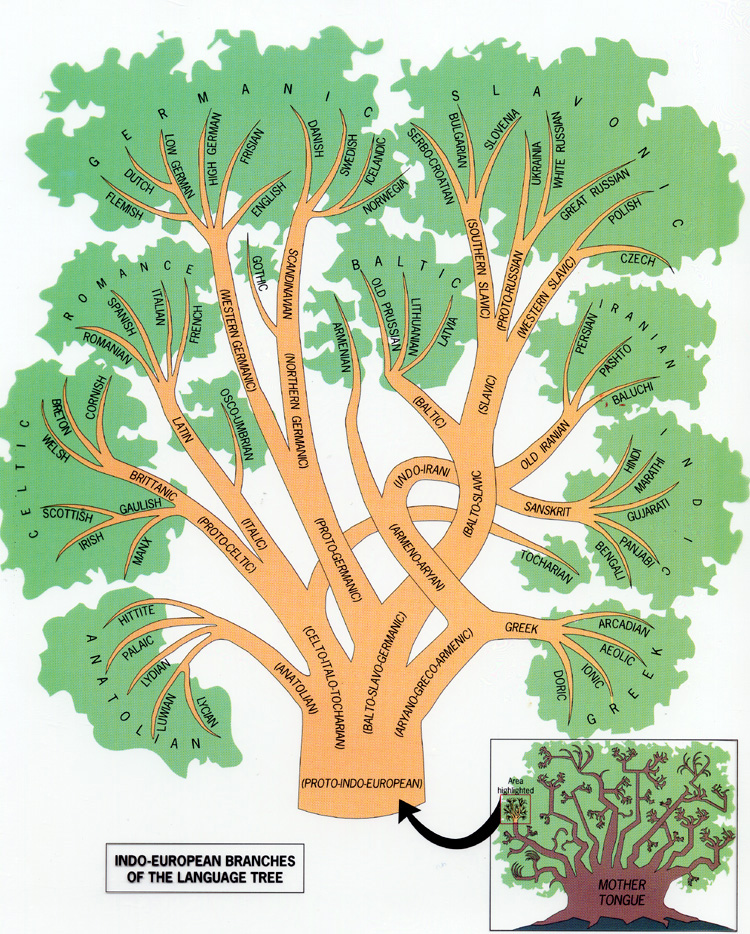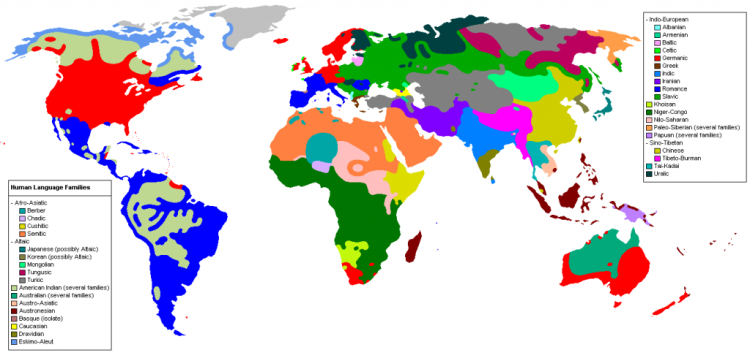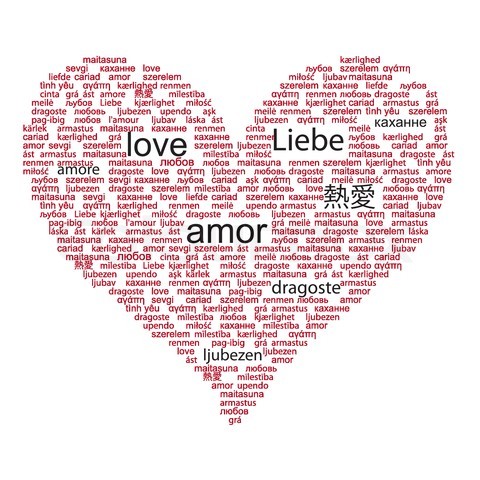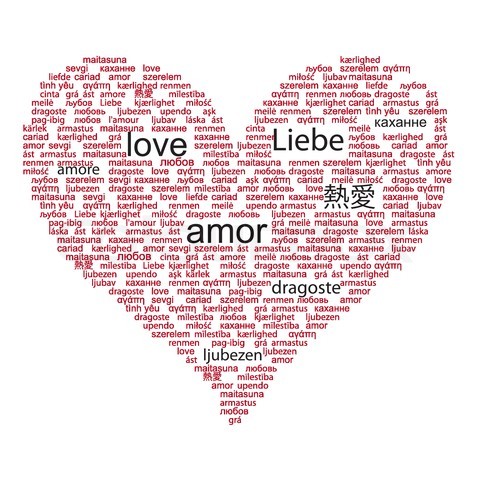I spent 4 years at a college in London University studying Africa and Asia. It was the most wonderful place due to the exposure of various languages and cultures and when I say various I mean hundreds. I remember one day on the train thinking to myself how many countries I had friends from. Given that I didn’t know every ones nationality, it says a lot that I went from A-Z almost off the top of my head.
One of my Professors was a certain Alexander Piatigorsky who died just a year or two ago at a very good age. He would be able to tell someone exactly where they came from going by their name and he would also know their ethnic group and how in 5-10 stages you could take that name or ethnic group and see how it relates to everyone else. He was a genius and was perhaps the finest Russian philosopher of all time. His lectures were always entertaining and he would both drink and smoke furiously while exploring various themes. He was quite formidable and had a habit of asking his students difficult questions at a complete tangent as to what he had been talking about. Due to his age he was rather deaf and his sight wasn’t so good either and people would try to sit one or two tables away in the small tutorial rooms in order that they didn’t get put on the spot. We were always highly entertained and we knew we were in the presence of a genius. If we were to answer a question incorrectly he would fume, not particularly at us but at the fact that the person or answer we gave was so obviously not fitting to a question. So many answers would lead him to have a deep inhale of his cigarette or a sip of tea before he would exclaim that the person we named in our answer was a “bastard”. He would always call me his Anglo-Saxon friend, I don’t think he remembered my name or anyone else but my ethnic group was clearly different from everyone else’s. For my part I would call him Professor Five Mountains as that is what his name meant.

Down in the student lounges and bars it was full of people speaking different languages. I spent several years talking to people not knowing exactly if they understood me and never quite certain if I understood them. It was quite common for a single conversation to take place in several languages and we would all adopt words and phrases to speak with people we otherwise couldn’t, without ever being sure we were being 100% correct. I used to find it amazing listening to Europeans speaking, English, French, German, Italian, Spanish and many others all in one go. There would be people from Armenia and Georgia and Iran and Turkey all cross-communicating in a mixture of English and their own languages plus one of the 4 or 5 neighbouring languages they also spoke.
Ever since then I made a note of words that had either a unique meaning or a cool sound that had no equivalent in English. I had only been there for a few hours when I first heard the German word Schaedenfreude which means to take joy in the suffering and misfortune of others. I heard that the British were the only nation who could feel Schaedenfreude about ourselves which I thought both funny and possibly true.
Here are a list of foreign words which have no English equivalent (at least none that are widely used) but which I’m sure you know the feeling that they convey.
1. Koi No Yokan
Japanese – The sense upon first meeting a person that the two of you are going to fall in love. (How cute)
2. Age-otori
Japanese: To look worse after a haircut ( I think we all know exactly what they mean by this!)
3. Waldeinsamkeit
German – The feeling of being alone in the woods (In a good way or a bad way I wonder)?
4. Manja
Malay – means to display gooey, childlike and coquettish behavior by women designed to elicit sympathy or pampering by men.
5. Backpfeifengesicht
German – A face badly in need of a fist (Only the Germans could have a word for this, long though as it is).
6. Sgriob
Gaelic – The itchiness that overcomes the upper lip just before taking a sip of whisky
7. Wabi-Sabi
Japanese – it refers to a way of living that emphasizes finding beauty in imperfection, and accepting the natural cycle of growth and decay. (This sounds like a nice take on life)
8. Bakku-shan
Japanese – A beautiful girl, as long as she’s being viewed from behind. (I think everyone has had this experience for men and women alike)
9. Meraki
Greek – Doing something with soul, creativity, or love. It’s when you put something of yourself into what you’re doing . (Sort of like a labour of love)
10. Nunchi
Korean – The subtle art of listening and gauging another’s mood. It could be described as the concept of emotional intelligence. Knowing what to say or do, or what not to say or do, in a given situation. (I think I have some good Nunchi skills)
11. Mamihlapinatapei
From Yagan, the indigenous language of the Tierra del Fuego region of South America. This word has been translated in several ways in English, always implying a wordless yet meaningful look shared by two people who both desire to initiate something but are both reluctant to start. (Like who is going to be the first person to have a slice of uncut cake)
12. Pena ajena
Mexican Spanish – The embarrassment you feel watching someone else’s humiliation (I get this all the time).
13. Pochemuchka
Russian – A person who asks a lot of questions (We all get annoyed by them don’t we?)
14. Schadenfreude
German – The pleasure derived from someone else’s pain (I get this with people I really don’t like)
15. Taarradhin
Arabic – refers to a happy solution for everyone. A way of reconciling without anyone losing face. Win-Win for all parties involved. (Perhaps a Happy Compromise is the best English translation for this)
16. Tatemae and Honne
Japanese – What you pretend to believe and what you actually believe, respectively. (I am a firm believer in Tatemae and Honne even if I am not sure how to say the words)
17. Yoko meshi
Japanese – Literally means ‘a meal eaten sideways,’ referring to the peculiar stress induced by speaking a foreign language (Yoko meshi is enough to give me Yoko Meshi)
18. Fremdschämen
German – Being embarrassed for someone who should be but isn’t. (Similar to number 12)
19. Aware
Japanese – Aware is a word, quite well-known, for the bittersweetness of a brief and fading moment of transcendent beauty. It’s that “last burst of summer” feel, or the transience of early spring. (I am aware that at the end of August we have aware weather)
20. Wei-wu-wei
Chinese – means conscious non-action. It’s a deliberate, and principled, decision to do nothing whatsoever, and to do it for a particular reason. (A bit of Wei-wu-wei is good for you every now and then)
21. Bricoleur
French – Is someone who starts building something with no clear plan, adding bits here and there, cobbling together a whole while flying by the seat of their pants. (I used to work for people like this)
22. Duende
Spanish – It’s original use was to describe a mythical entity that lives in forests, sort of like a fairy or a sprite, that possesses human beings and causes them to feel awe, fear, or a sense of beauty in their natural surroundings. Since being updated by the Spanish poet and playwright, Federico García Lorca, in the early 20th century, it is now used to refer to the mysterious power of a work of art to deeply move a person. (If anyone feels Duende from reading this, do let me know)
23. Saudade
Portugese – refers to the feeling of longing for something or someone who you love and which is lost. (That Suadade feeling never seems to go away for me)
24. Hyggelig
Denmark – In Denmark, the word Hyggelig is used often, and is said to be closely tied to the Danish national character. A dictionary will provide translations along the lines of cozy, warm, and nice, but a typical Dane will argue that these words don’t come close to capturing the full meaning of the word. (We often think of Danes being nice so it is good that they have a word that matches how everyone feels about them).
25. Ya’aburnee
Arabic – This word means “You bury me,” a declaration of one’s hope that they’ll die before another person because of how difficult it would be to live without them. (You don’t get words like this in western languages do you?)
26. L’appel du vide
French – “The call of the void” is this French expression’s literal translation, but more significantly it’s used to describe the instinctive urge to jump from high places. (I sometimes get this, it is a bizarre feeling).
27. Tingo
From the Pascuense language of Easter Island, it is the act of taking objects one desires from the house of a friend by gradually borrowing all of them. (We all know people who employ a bit of Tingo from time to time).
28. Jayus
From Indonesian, meaning a joke so poorly told and so unfunny that one cannot help but laugh. (I know that feeling)
29. Prozvonit
In both Czech and Slovak language, this word means to call a mobile phone only to have it ring once so that the other person would call back, allowing the caller not to spend money on minutes. (Doesn’t everyone do that from time to time, especially if in a hotel room?)
30. Kyoikumama
In Japanese, this word refers to a mother who relentlessly pushes her children toward academic achievement. (We have a few words for this in English but most of them are rude).
31. Tartle
A Scottish verb meaning to hesitate while introducing someone due to having forgotten his/her name. (I’ve done this many a time without knowing it was a Tartle. Normally I think of a way to rephrase the sentence to avoid admitting I have forgotten their name).
32. Iktsuarpok
From the Inuit, the feeling of anticipation when you’re waiting for someone to show up at your house and you keep going outside to see if they’re there yet. (I do that sometimes when people are late, I guess some do it if they are burying bodies in the garden too).
33. Cafuné
From Brazilian Portuguese, meaning to tenderly run one’s fingers through someone’s hair. (Who doesn’t like a bit of Cafune from time to time?)
34. Torschlusspanik
From German, this word literally means “gate-closing panic” and is used to describe the fear of diminishing opportunities as one ages. This word is most frequently applied to women who race the “biological clock” to wed and bear children. (Or job-hunting in my situation)
35. Ilunga
From the Tshiluba language spoken in south-eastern Democratic Republic of the Congo, this word has been chosen by numerous translators as the world’s most untranslatable word. Ilunga indicates a person who is ready to forgive any abuse the first time it occurs, to tolerate it the second time, but to neither forgive nor tolerate a third offence. (Three strikes and you’re out!)
36. Dépaysement
French – The feeling that comes from not being in one’s home country. (I don’t really get this feeling, not even when I’m in France).
37. Kitsch
German – Refers to tacky, gaudy art or trinkets, the kind of thing purchased by people with bad taste. (It seems there are more Kitsch people than tasteful people where I live).
38. Litost
Czech – Milan Kundera, author of The Unbearable Lightness of Being, remarked that “As for the meaning of this word, I have looked in vain in other languages for an equivalent, though I find it difficult to imagine how anyone can understand the human soul without it.” The closest definition is a state of agony and torment created by the sudden sight of one’s own misery. (So it’s like checking your watch at work hoping it is nearly home time and finding out it is just 8.30am??)

39. Toska
Russian – Vladmir Nabokov describes it best: “No single word in English renders all the shades of toska. At its deepest and most painful, it is a sensation of great spiritual anguish, often without any specific cause. At less morbid levels it is a dull ache of the soul, a longing with nothing to long for, a sick pining, a vague restlessness, mental throes, yearning. In particular cases it may be the desire for somebody of something specific, nostalgia, love-sickness. At the lowest level it grades into ennui, boredom.” (Now I know I have been living in a state of Toska for ages).
40. Shemomedjamo
Georgian – You know when you’re really full, but your meal is just so delicious, you can’t stop eating it? The Georgians feel your pain. This word means, “I accidentally ate the whole thing.” (Another good reason to visit Georgia)
41. Pelinti Buli, Ghana – Your friend bites into a piece of piping hot pizza, then opens his mouth and sort of tilts his head around while making an “aaaarrrahh” noise. The Ghanaians have a word for that. More specifically, it means “to move hot food around in your mouth.” (What is the Ghanaian term for doing that but realising the food is far too hot and after burning your tongue and the roof of your mouth you have to get rid of it?)
42. Layogenic
Tagalog – This means that something looks good from far away but when you get closer, it looks a real mess. (Kind of like this blog when I think of it)
43. Rhwe
Tsonga, South Africa – College kids, relax. There’s actually a word for “to sleep on the floor without a mat, while drunk and naked.” (Can’t say I have ever done a Rhewe myself).
44. Zeg
Georgian – It means “the day after tomorrow.” Seriously, why don’t we have a word for that in English? (I think this is my favourite word. In English there is overmorrow but Zeg is just so much better).
45. Pålegg
Norweigian – Sandwich Artists unite! The Norwegians have a non-specific descriptor for anything — ham, cheese, jam, Nutella, mustard, herring, pickles, Doritos, you name it — you might consider putting into a sandwich. (I’m with the Norwegians on this one, pretty much anything is Palegg for me).
46. Lagom
Swedish – This slippery little word is hard to define, but means something like, “Not too much, and not too little, but juuuuust right.” (Sort of like Spot On then).
47. Gezellig –
Dutch – This all-encompassing word is often translated as “cozy,” but it describes an atmosphere which is a whole bunch of warm fuzzy feelings all wrapped up in eight letters – cozy, pleasant, friendly, convivial, quaint, fun, sociable, delightful, togetherness, belonging… (Who doesn’t feel a bit Gezellig just thinking about this?)
48. Greng-jai
Thai – That feeling you get when you don’t want someone to do something for you because it would be a pain for them. (Greng-Jai is horrible, if I get it then I tend not to ask anyone).
49. Kaelling
Danish – You know that woman who stands on her doorstep (or in line at the supermarket, or at the park, or in a restaurant) cursing at her children? The Danes know her, too. (Somedays you don’t see anyone but Kaellings do you?)
50. Arigata-meiwaku
Japanese – An act someone does for you that you didn’t want to have them do and tried to avoid having them do, but they went ahead anyway, determined to do you a favour, and then things went wrong and caused you a lot of trouble, yet in the end social conventions required you to express gratitude. (This seems to happen a lot to me).
51. Desenrascanço
Portuguese – “to disentangle” yourself out of a bad situation (Maybe I should try and Desenrascanco myself out of Arigata-meiwaku above).
52. Forelsket
Norwegian – The euphoria you experience when you are first falling in love (awww, you mean it doesn’t last for at least 7 years for everyone else?)
53. Gigil
Filipino – The urge to pinch or squeeze something that is unbearably cute (I know someone who has that and its often my cheeks that are pinched!)
54. Guanxi
Mandarin – In traditional Chinese society, you would build up good guanxi by giving gifts to people, taking them to dinner, or doing them a favour, but you can also use up your gianxi by asking for a favour to be repaid (In English isn’t this just being a friend?)
55. L’esprit de l’escalier
French – usually translated as “staircase wit,” is the act of thinking of a clever comeback when it is too late to deliver it (I know people who suffer from this, luckily I am always able to give an instant retort).
56. Avant-Garde
French – A group active in the invention and application of new techniques in a given field, especially in the arts (Come to think of it, I knew this when I was about 5 so it beats Schadenfreude for me).
57. Kummerspeck
German – which refers to excess weight gained due to emotional overeating (We should let the Georgians know what will happen to them if they keep eating when full).
58. Verschlimmbesserung
German – A verschlimmbesserung is a supposed improvement that makes things worse. (My old work used to be one verschlimmbesserung after another).
59. Orenda
Huron – Orenda is the invocation of the power of human will to change the world around us. It is set up to be the opposing force to fate or destiny. (If only I knew about Orenda when I was going through all that verschlimmbesserung!)
60. Gâchis
French – This one means ‘a wasted opportunity.’ Specifically it means an opportunity that was wasted by ineptness being hurled at it from all directions. (Back to work again)
61. Weltschmerz
German – It could be termed world-weariness or ennui, but this particular has the quirk of almost only being applied to privileged young people. (These people are truly insufferable I find).
62. Kalpa
Sanskrit – Means time passing on a cosmic scale (Doing this listing is pretty Kalpa).
63. Razbliuto
Russian – It describes the feeling that a person (generally meant to be a man) has for the person who he once loved, but now no longer loves. (Not sure I have ever had that).
64. Uitwaaien
Dutch – It means to take a brief break in the country side to clear one’s head. (I have an Uitwaaien coming up in September and can’t wait for it).
65. Qualunquismo
Italian – Means someone who does not care at all about about politics and issues in society. (That’s why Silvio Berlusconi kept getting elected I guess)
66. Zalatwic
Polish – Refers to the use of friends, bribes, personal charm or connections to get something done. (I’ve used friends and charm but not bribes, well maybe on holiday but I don’t remember).
67. Zhaghzhagh
Persian – The chattering of teeth from the cold or from rage. (What a great term, for something that happens so often. I might prefer this even over Zeg).
68. Yuputka
Ulwa – A word made for walking in the woods at night. (I wonder what the Germans at number 3 make of this?)
69. Slampadato
Italian – Means being addicted to the UV glow of tanning salons. (As if Italians need to use tanning salons).
70. Luftmensch
Yiddish – It means an impractical dreamer with no business sense. (It’s bad when your President or Prime Minister might be suffering from this)
71. Cotisuelto
Caribbean Spanish – It means one who wears the shirt tail outside of his trousers. (One to remember for future reference I think).
72. Pana Po’o
Hawaiian – It means to scratch your head in order to help you remember something you’ve forgotten. (It is funny why people scratch their heads when they are trying to remember. People don’t scratch their legs when they want to run faster).
73. Gumusservi
Turkish – It means moonlight shining on water. (I like a bit of Gumusservi)
74. Vybafnout
Czech – It means to jump out and say boo. (A bit of Vybafnout combined with a bit of Gumusservi sounds like a bit of fun)!
75. Mencolek
Indonesian – Refers to the act of tapping someone lightly on the opposite shoulder from behind to fool them (Mencolek once, shame on you, Mencolek twice, shame on me).
76. Faamiti
Samoan – To make a squeaking sound by sucking air past the lips in order to gain the attention of a dog or child. (I can do this but isn’t it easier to whistle?)
77. Glas wen
Welsh – A smile that is insincere or mocking. Literally, a blue smile. (I prefer people to look miserable if they don’t mean it. Nothing more annoying than people pretending to be happy).
78. Boketto
Japanese – The act of gazing vacantly into the distance without thinking. (I guess some of you are feeling a bit Boketto about now)
81. Pisan Zapra
Malay – The time needed to eat a banana (As I don’t like banana’s, this one is probably the least like foreign phrase I will ever use).
82. Pesmenteiro
Portugal – One who shows up to a funeral for the food (A bit like in that film The Wedding Crashers but for funerals I guess).
83. Shitta
Farsi -Leftover dinner eaten for breakfast (I actually had some Shitta today).
84. Manque
French – Having failed to become what one might have been. (Interesting that this is a French word really and not an English one. I think this applies to me).
85. Tsujigiri
Japanese – To test a new sword casually on a passerby. (How fantastic that enough people in Japan have actually done this that there is a need to create a word for it).
86. Téng (疼) is a special term for love in Chinese. It’s the same character as “to hurt” (as in “my stomach hurts”), and so it is love mixed with an ache or pain. It is really only used from a parent to a child. (What an interesting phrase).
87. Ungdayee is the Hindi word for that stretch that you do first thing in the morning when you’ve just woken up. Why isn’t there an English word for this?
88. You know at the bottoms of pans you get that food that is stuck to the bottom, maybe a bit burnt? In Ecuador they have a word for this stuff, Concolon.
89. Firgun is the amazing Hebrew concept for taking pleasure in someone else’s success, with a good heart and without jealousy. The opposite is the German Schadenfreude, when you take joy in someone else’s misfortune.
90. T’aarof is the Farsi word for a standard of etiquette that runs deep in Iranian culture, a concept that captures both the symbolism and elusiveness embedded in the language. A host must offer a guest anything they desire, even if the offer is not genuine, but then the guest must also refuse. This exchange repeats itself many times (which would be lost on someone outside the culture), until the host and guest are able to somehow determine whether both the offer and refusal are genuine or just polite. (Having known many Iranians and Middle-East customs in general, I know just what they are getting at).

91. Dor in Romanian is similar to the Portuguese saudade—the longing of missing someone. (As I write this I am experiencing Dor for my lovely wife).
92. Kreislaufstörung in German is directly translated as a circulatory disturbance or circulation disorder. (Apparently there are a large number of minor illnesses they have in Germany and France that English speaking people totally ignore).
93. Gökotta this is a lovely one that I can well imagine and is the Swedish word for getting up especially early to hear the bird song or appreciate nature.
94. I love the smell of the earth after it rains and Tamil has a word for it: Mannvaasanai, the smell of wet earth when the first rain of the season hits the ground.
95. Chutzpah: Cheek but with extremely self-confident audacity. This one has Yiddish origins but is widely used in parts of the USA. I never heard the word until I was at least 20.
96. Stramash: Fight, uproar. Scottish and northern English. ( I am from this region and I know lots of unique words from there but this isn’t one of them, sounds good though).
97. Seigneur-terraces (French) Coffee shop dwellers who sit at tables a long time but spend little money. (They are probably thinking that they are Manque 84)
98. Packesel (German) The packesel is the person who’s stuck carrying everyone else’s bags on a trip. (Been there, done that)
99. Cavoli Riscaldati (Italian) The result of attempting to revive an unworkable relationship which is literally translated as “reheated cabbage”.
100. Bilita Mpash (Bantu) An amazing dream. Not just a “good” dream; the opposite of a nightmare. ( only ever have nightmares)
101. Schlemiel (Yiddish) The schlemiel is the traditional maladroit, who spills his coffee (This isn’t usually me, partly because I don’t drink coffee but mostly because I am more 101 below)
102. Schlimazel (Yiddish) Someone prone to bad luck. The schlimazel is the one on whom it’s spilled. (I think this is a great distinction as there are definitely people who have bad luck because they are clumsy or not thinking properly and others who have bad luck due to unforeseen circumstances or the idiocy of others).
Sadly I couldn’t come up with all these myself so my thanks go to Rosetta Stone, The Independent Newspaper, Feedbacq and Mental Floss.
If you enjoyed this post you might like my book Straight From The Horse’s Mouth which takes a whimsical but fascinating look at 100 of our most interesting Idioms and sayings.


I could not access your new blog, ” A Gruntled look at Orphan Negatives.” I think your spell checker must have exploded! So I looked at this one instead!
Your professor should have told you about the Welsh “hiraeth”, bach, isn’t it!
😀
LikeLiked by 1 person
The new post was published in error just a few hours after the planned one. So as only 9 people had viewed it, I rescheduled it for Monday!
LikeLiked by 1 person
Ah, so I got a sneak peak in my e-mail?
I’ll look forward to the final, oubuished version!
LikeLiked by 1 person
DOH! I hate not being able to edit typos on Word Press! That should have been “published”, of course!
Sometimes, my figners make my typnig look like I have dokney hooves!
LikeLiked by 1 person